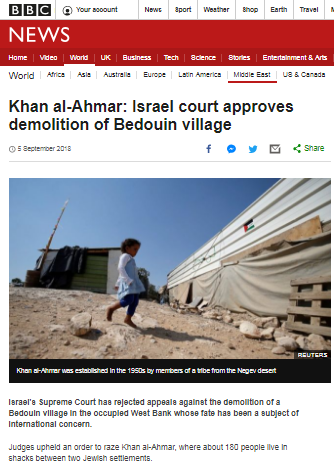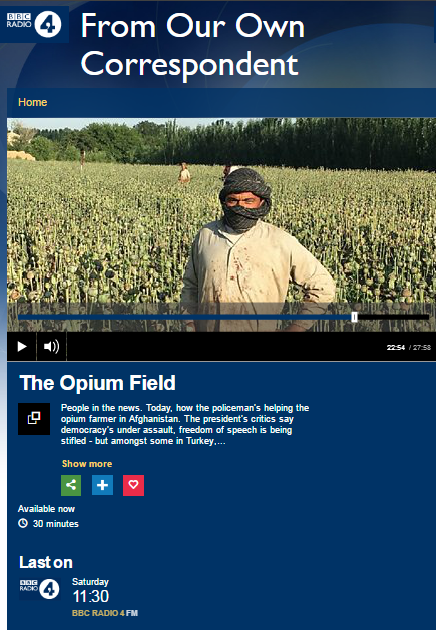Listeners to the BBC’s domestic station Radio 4 had been prepared in advance for what the corporation apparently believed was going to be a major news event on Saturday, March 30th.
The March 29th edition of BBC Radio 4’s flagship news and current affairs programme ‘Today’ included a pre-emptive report (from 1:14:55 here) by Jerusalem correspondent Tom Bateman which utilised the standard framing of the ‘Great Return March’ to which BBC audiences have been exposed for an entire year.
That framing includes:
- Erasing the fact that around 80% of those killed during the violent rioting at the border have been shown to be affiliated with various terror organisations – primarily Hamas.
- Erasing or downplaying the violent nature of the events by failing to provide audiences with a representative view of the number of attacks using firebombs, IEDs, grenades and guns, the number of border infiltrations and the number of rockets and mortars launched throughout the past year. As of March 29th 2019, BBC audiences had heard nothing whatsoever about the use of airborne explosive devices or the activities of Hamas’ so-called ‘night confusion/disturbance units’.
- Erasing or downplaying the violent nature of the events by uniformly describing them as ‘protests’, ‘demonstrations’ or ‘rallies’.
- Failing to provide adequate context concerning the stated aims of the events including ‘right of return’ and lifting of counter-terrorism measures.
- Erasing or downplaying Hamas’ role in initiating, facilitating, organising, financing, executing and controlling the events and euphemising terrorists as ‘militants’.
- Citing casualty figures provided by “health officials” without clarifying that they are part of the same terror group that organises the violent rioting.
Listeners heard presenter John Humphrys introduce the item: [emphasis in italics in the original, emphasis in bold added]
Humphrys: “Tomorrow marks a year since Palestinians began protesting at Gaza’s fence with Israel. Hamas – the militant group that runs the Gaza Strip – is marking the anniversary calling for a million-person march at the fence.”
Audiences then heard an audio version of Bateman’s context-free report from a clinic in Gaza City which included the following:
Bateman: “22-year-old Iyyad who was shot at Gaza’s perimeter fence last May. He tells me he nearly lost his leg. He’s been coming here to the clinic for months to learn to walk again. Some seven thousand Palestinians have been injured by Israeli bullets in the last year. More than 190 have been killed. An Israeli soldier was shot dead by a Palestinian gunman last summer. As tomorrow’s anniversary looms, tensions have been ratcheting up.”
Bateman did not bother to clarify what his interviewee was doing at the time he was shot and while citing numbers of Palestinian casualties, erased both the terror affiliations of most of those killed and the violence in which they were participating from audience view.
That formula was again evident the next day in two news bulletins aired during the March 30th edition of ‘Today’. At 05:48 listeners were told by newsreader Chris Aldridge that:
“Thousands of Palestinians are gathering along the Israel-Gaza border to mark the start of weekly protests a year ago. Israeli forces have killed nearly 200 Palestinian demonstrators during that time while one Israeli soldier has died and a Palestinian is reported to have been shot dead this morning. The leader of Hamas, which controls Gaza, has called for a million people to join today’s action.”
In an additional news bulletin at 1:06:35 Aldridge told audiences:
“Thousands of Palestinians are gathering along the Israel-Gaza border to mark the start of weekly protests a year ago. Israeli forces have killed nearly 200 Palestinian demonstrators during that time and a Palestinian is reported to have been shot dead this morning.”
Audiences were not told that the man “shot dead this morning” was participating in violent rioting at the time and was apparently a member of the so-called ‘night disturbance units’ active along the border fence during darkness. Aldridge’s claim that “Palestinians are gathering” was shown to be premature in a third item aired at 1:57:30 which was introduced by presenter Nick Robinson.
Robinson: “All this week we’ve been hearing about the mounting tension ahead of the first anniversary of protests at the border between Gaza and Israel. There’s reports this morning that Israeli fire has killed a Palestinian man at that border. Tom Bateman is our Middle East correspondent. What do we know Tom?”
Bateman: “Well we know that a 20-year-old man has died already this morning. That was announced by the ministry of health here in Gaza. The circumstances are unclear. We don’t know if it was at one of the protest sites. It doesn’t appear to have been actually and it was very early in the morning. But already it adds to the tension and in the next hour or so after noon prayers there will be thousands of Palestinians who’ll make their way in buses and on foot to five protest sites at the perimeter fence with Gaza. On the other side of the fence the Israeli military build-up…ah…has led to there being around 200 snipers positioned all around the fence and three extra brigades of Israeli forces there.”
Robinson: “The Palestinians who go know the risk they take. The Israelis know the condemnation they will get if they open fire. Nothing seems to change.”
Bateman: “Well this will certainly be I think the biggest protest in months because of that first anniversary. The protests have actually…the numbers have really been dwindling over the weeks as they began a year ago, leaving a sort of hard-core of protesters who were going once a week. But I think the sense in Gaza is that people want to go to the fence to demonstrate. Now Hamas have called for these to be peaceful after some intensive negotiations…ah…indirect negotiations between the two sides. That of course remains to be seen. Israel is saying it is prepared for any eventuality with that build-up of troops. It comes at a time of elections in Israel – a very sensitive moment – and I think we’ll see as we enter the afternoon just how…just how that tension continues, just how it mounts and the Israeli prime minister Benjamin Netanyahu has said they are prepared for any eventualities.”
Listeners were then told that the upcoming Israeli election is a two-horse race.
Robinson: “Tom Bateman our Middle East correspondent thank you very much indeed. Yes, that election between the prime minister Benjamin Netanyahu and against the former military chief Benny Gantz is in just a few days.”
As we see listeners to the ‘Today’ programme heard a one-sided and highly sanitised portrayal of the ‘Great Return March’ which adhered to the editorial policies that have been in evidence throughout the past twelve months. In part two of this post we will see whether Radio 4’s subsequent programmes throughout the day provided audiences with a more comprehensive picture.




